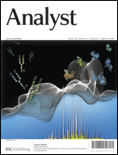
ANALYST
Scope & Guideline
Elevating Knowledge in the Heart of Chemical Research
Introduction
Aims and Scopes
- Analytical Techniques Development:
The journal emphasizes the development and refinement of analytical techniques, including mass spectrometry, chromatography, and electrochemical sensors, to enhance sensitivity, specificity, and efficiency. - Biochemical and Biomedical Applications:
Research published in 'ANALYST' often explores the application of analytical techniques in biochemistry and biomedicine, focusing on disease diagnostics, biomarker detection, and drug monitoring. - Environmental Monitoring:
The scope includes the development of methods for environmental analysis, such as detection of pollutants and toxins in water and food, showcasing the journal's commitment to addressing global environmental challenges. - Nanotechnology in Sensing:
The journal highlights advancements in nanotechnology, particularly the use of nanomaterials to enhance the performance of sensors and biosensors, enabling more sensitive and selective detection methods. - Point-of-Care Testing Innovations:
'ANALYST' features research on point-of-care testing methods, providing insights into portable and rapid diagnostic tools that can be used in clinical and field settings. - Machine Learning and Data Analysis in Analytical Chemistry:
The integration of machine learning and advanced data analysis techniques into analytical chemistry is a growing focus, aimed at improving data interpretation and enhancing analytical methodologies.
Trending and Emerging
- Fluorescent Probes and Sensors:
The use of fluorescent probes for detection and imaging applications is a rapidly growing area, with research focusing on novel designs for real-time monitoring of biological processes. - Microfluidics and Lab-on-a-Chip Technologies:
There is a significant increase in studies related to microfluidic devices and lab-on-a-chip systems, emphasizing their potential for rapid, on-site analysis in clinical and environmental settings. - Machine Learning Integration:
Integration of machine learning techniques into analytical methods is increasingly prevalent, enhancing data analysis capabilities and improving the accuracy and efficiency of analytical processes. - Point-of-Care Diagnostics:
Research dedicated to point-of-care diagnostics is on the rise, highlighting the need for portable, user-friendly devices for rapid health assessments and disease monitoring. - Nanotechnology in Biosensing:
The application of nanomaterials in biosensing and detection technologies continues to expand, with increased focus on their unique properties to improve sensitivity and selectivity in various assays. - Environmental and Food Safety Monitoring:
Emerging themes include the development of advanced analytical methods for the detection of contaminants in food and environmental samples, reflecting growing public health concerns.
Declining or Waning
- Traditional Chemical Analysis Methods:
There is a noticeable decrease in publications focused on conventional analytical methods that do not incorporate modern advancements, signaling a shift towards more innovative and integrated approaches. - Basic Theoretical Studies:
The journal has seen fewer submissions that focus purely on theoretical aspects of analytical chemistry without practical applications or technological advancements, indicating a trend towards applied research. - Non-Spectroscopic Techniques:
Research utilizing non-spectroscopic methods, such as basic gravimetric or volumetric techniques, appears to be waning, as the field increasingly favors spectroscopic and sensor-based approaches. - General Reviews of Established Techniques:
While comprehensive reviews are valuable, there is a shift away from general reviews of well-established techniques in favor of more focused, cutting-edge discussions that highlight novel advancements and applications. - Environmental Chemistry without Analytical Focus:
Research focusing on environmental chemistry without a strong analytical component has declined, suggesting that submissions are increasingly expected to integrate analytical methodologies with environmental science.
Similar Journals
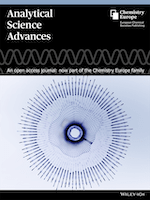
Analytical Science Advances
Advancing the Frontiers of Analytical ChemistryAnalytical Science Advances is a dynamic journal published by WILEY, dedicated to the ever-evolving field of analytical chemistry. With an ISSN of 2628-5452, this open-access platform aims to disseminate high-quality research and insightful reviews that push the boundaries of analytical methodologies and instrumentation. Since its inception in 2020, the journal has gained traction, securing a commendable Q2 ranking in 2023 within its category, highlighting its significance in the scientific community. Currently positioned at Rank #68 out of 156 in Scopus' analytical chemistry category, it boasts a 56th percentile ranking, reflecting its contributions to advancing analytical techniques. Researchers, professionals, and students will find this journal an invaluable resource for keeping abreast of the latest developments, emerging technologies, and innovative approaches in analytical science, ensuring the journal's relevancy and influence in shaping future discoveries.

ANALYTICAL AND BIOANALYTICAL CHEMISTRY
Pioneering Innovative Research in ChemistryANALYTICAL AND BIOANALYTICAL CHEMISTRY, published by SPRINGER HEIDELBERG, is a leading international journal that serves as a vital platform for innovative research in the fields of analytical and bioanalytical chemistry. With an impressive impact factor and ranking in the Q2 category for both Analytical Chemistry and Biochemistry, the journal highlights key advancements and methodologies that drive the discipline forward. Established in 1996 and continuing vigorously into 2024, it has gained significant recognition with Scopus rankings placing it in the 83rd and 78th percentiles within its categories, underscoring its impact and relevance. The journal's commitment to open access facilitates widespread dissemination of critical scientific knowledge, making it an essential resource for researchers, professionals, and students dedicated to exploring the complexities of chemical analysis. With its base in Heidelberg, Germany, ANALYTICAL AND BIOANALYTICAL CHEMISTRY continues to inspire and influence the global research community.
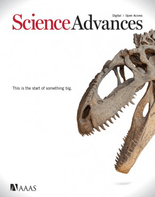
Science Advances
Connecting Researchers, Inspiring DiscoveriesScience Advances, published by the American Association for the Advancement of Science, is a leading open-access journal in the field of multidisciplinary sciences. Since its inception in 2015, it has rapidly gained prominence, achieving a remarkable Q1 ranking in both Medicine (miscellaneous) and Multidisciplinary categories, underlining its impact and relevance in contemporary research. With an impressive Scopus ranking of #7 out of 171 in the Multidisciplinary field, it proudly sits in the 96th percentile, showcasing its dedication to disseminating high-quality research across various scientific domains. This journal not only provides open access to innovative findings but also aims to foster collaboration and maintain a high standard of scholarly communication among researchers, professionals, and students globally. Stay updated with some of the most groundbreaking advancements and contribute to the collective pursuit of scientific knowledge through Science Advances.
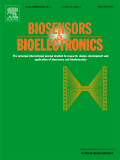
BIOSENSORS & BIOELECTRONICS
Connecting Researchers to the Pulse of Bioelectronic AdvancementsBIOSENSORS & BIOELECTRONICS, published by Elsevier Advanced Technology, is at the forefront of research and innovation in the realms of biomedical engineering, biophysics, and biotechnology. Established in 1990, this esteemed journal has established itself as a premier platform, receiving a prestigious Q1 ranking across multiple categories, including Electrochemistry and Nanoscience, reflecting its critical impact on advancing scientific knowledge and technology. With an impressive range of topics, including the latest trends in biosensor development and bioelectronic application, it serves as an invaluable resource for researchers, professionals, and students alike, facilitating collaborative dialogue and innovative solutions. Though primarily subscription-based, the journal is accessible from its UK headquarters in Oxford, promising rigorous peer-reviewed articles that inform future trends and applications in this dynamic field.
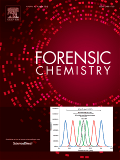
Forensic Chemistry
Bridging disciplines for impactful forensic research.Forensic Chemistry is a premier journal published by Elsevier, specializing in the interdisciplinary field of forensic science, with a strong emphasis on analytical and materials chemistry, pathology, and law. Established in 2016 and converging to a significant publication trajectory through 2024, the journal has rapidly ascended to an impressive Q1 ranking across multiple categories, demonstrating its impact and commitment to advancing forensic analysis and methodologies. With an impact factor reflecting its relevance—especially notable with a 95th percentile rank in Social Sciences and Law—Forensic Chemistry serves as an essential resource for researchers, legal authorities, and academics seeking to explore the latest developments in forensic techniques and applications. Its rigorous peer-review process and high-quality publications ensure that it remains at the forefront of scientific inquiry in forensic practices. Access to the journal is available without an open access model, further emphasizing its commitment to curated, high-impact scholarship that contributes to both theoretical foundations and practical applications in the forensic field.
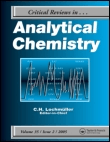
CRITICAL REVIEWS IN ANALYTICAL CHEMISTRY
Transforming Discoveries into Comprehensive Reviews.Critical Reviews in Analytical Chemistry, published by Taylor & Francis Inc, stands as a pivotal journal in the field of analytical chemistry, contributing significantly to its advancement since its inception in 1989. With an impressive Q1 ranking in the 2023 analytical chemistry category, it positions itself among the top 15 journals in the field, reflecting its high impact and relevance, as evidenced by a 90th percentile Scopus rank. This esteemed journal is dedicated to publishing comprehensive reviews that synthesize current research and emerging methods in analytical techniques, making it an invaluable resource for researchers, professionals, and students alike. With the goal of fostering innovation and collaboration, Critical Reviews in Analytical Chemistry continues to address challenges and breakthroughs within the sphere of analytical methodologies, ensuring its authors and readers remain at the forefront of scientific discovery.

CHINESE JOURNAL OF ANALYTICAL CHEMISTRY
Empowering Research through Analytical InsightsCHINESE JOURNAL OF ANALYTICAL CHEMISTRY, published by SCIENCE PRESS in China, stands as a prominent platform in the field of analytical chemistry since its inception in 1989. With its ISSN 0253-3820 and E-ISSN 1872-2040, the journal maintains a vital role in disseminating empirical research and innovative methodologies, contributing to the advancement of analytical techniques and their applications. The 2023 Scopus ranking positions the journal in the third quartile (Q3) within its category, reflecting a respectable standing among its peers. Researchers, professionals, and students alike engage with a broad range of topics, from instrumental analysis to environmental monitoring, each aiming to foster further scientific inquiry. Although it does not currently offer Open Access, the journal's rich repository of knowledge continues to be an essential resource for those in the analytical chemistry community, with an enduring commitment to scientific excellence and collaboration.

Chemosensors
Empowering Science through Open Access ResearchChemosensors is a distinguished open-access journal published by MDPI, focusing on the innovative field of analytical chemistry and physical and theoretical chemistry. Since its inception in 2013, the journal has rapidly established itself as a pivotal platform for the dissemination of cutting-edge research related to the development and application of chemical sensors, encompassing various methodologies and technologies that contribute to advancements in diagnostics, environmental monitoring, and industrial applications. Based in Switzerland, the journal operates with a commitment to accessibility, ensuring that all published articles are freely available to a global readership. With a current impact factor that positions it in the Q2 quartile for both Analytical Chemistry and Physical and Theoretical Chemistry, Chemosensors attracts a diverse audience of researchers, professionals, and students eager to explore new findings and foster collaborative efforts in sensor technology and its applications. As it continues to grow, Chemosensors remains devoted to advancing scientific knowledge and innovation in its field, making significant contributions to the global scientific community through its rigorous peer-review process.
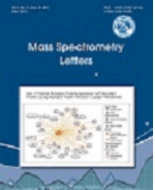
Mass Spectrometry Letters
Unveiling the Future of Mass Spectrometry Research.Mass Spectrometry Letters is a pioneering open-access journal published by the Korean Society for Mass Spectrometry, specializing in the diverse fields of analytical chemistry, biochemistry, and spectroscopy. Established in 2010, this journal aims to disseminate groundbreaking research and advancements in mass spectrometry and its applications across various scientific domains. Though currently categorized in the Q4 quartile in key analytical fields, Mass Spectrometry Letters serves as an essential platform for researchers, professionals, and students to share innovative methodologies, emerging trends, and practical applications of mass spectrometry, thus fostering collaboration and advancing knowledge in the scientific community. With a commitment to open access, articles published since 2010 are readily available, enabling widespread distribution and engagement within the international research community. Located in Daejeon, South Korea, and actively converging research through 2024, the journal holds the potential to grow its impact and relevance within the dynamic landscape of mass spectrometry.

Biosensors-Basel
Fostering collaboration in the world of biosensors.Biosensors-Basel is a premier Open Access journal, published by MDPI since 2011, dedicated to advancing the field of biosensors and related technologies. With its academic headquarters in Basel, Switzerland, the journal serves as a vital resource for researchers, professionals, and students across various disciplines, including Analytical Chemistry, Biomedical Engineering, Biotechnology, and Clinical Biochemistry. Boasting an impressive range of quartile rankings—such as Q1 in Instrumentation and Q2 across several other categories—Biosensors-Basel is recognized for its high-impact research and significant contributions to the scientific community, evidenced by Scopus rankings that place it among the top journals in its field. The journal's open-access model ensures that cutting-edge findings are accessible to a global audience, promoting collaboration and innovation in biosensor technology and its applications. Scholars and professionals looking to stay on the forefront of this dynamic field will find Biosensors-Basel an indispensable platform for sharing knowledge and fostering advancements.